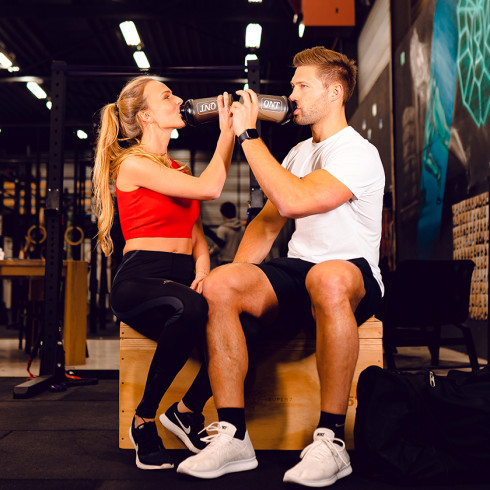Electrolytes: Why Are They Crucial for Hydration?
TABLE OF CONTENTS
- What are the essential electrolytes for the body?
- Why are electrolytes important for hydration?
- How do electrolytes help maintain fluid balance?
- Which foods contain electrolytes?
- How can I tell if I'm lacking electrolytes?
- Is it necessary to take electrolyte supplements to stay hydrated?
- What are the best electrolytes for athletes?
- How can you replenish electrolytes after a workout?
- What are the risks of having too many electrolytes in the body?
- How do electrolytes influence sports performance?
- Are sports drinks effective for restoring electrolytes?
- Coach's tips
WHAT ARE THE ESSENTIAL ELECTROLYTES FOR THE BODY?
Electrolytes are minerals present in the body that carry an electrical charge. They play a fundamental role in various bodily functions, including hydration, acid-base balance regulation, nerve and muscle function, and fluid balance. The main essential electrolytes for the human body are:
Sodium (Na⁺)
Sodium is the most abundant electrolyte in extracellular fluid (outside the cells). It is crucial for maintaining blood pressure and body fluid balance. It also plays a key role in transmitting nerve impulses and muscle contraction. Too much or too little sodium can lead to serious health issues, including hypertension or hyponatremia (sodium deficiency).
Potassium (K⁺)
Potassium is found mainly inside the cells. It is essential for muscle function, including that of the heart. It helps maintain water balance inside cells and plays a crucial role in transmitting nerve signals. A potassium deficiency can cause muscle cramps, weakness, and heart rhythm disturbances, while an excess can be toxic, potentially causing life-threatening cardiac arrhythmias.
Calcium (Ca²⁺)
Calcium is the most abundant mineral in the human body and is essential for healthy bones and teeth. But it also plays a key role in muscle contraction, nerve signal transmission, and blood clotting. Insufficient calcium levels can lead to muscle cramps, spasms, and an increased risk of fractures.
Magnesium (Mg²⁺)
Magnesium is involved in over 300 enzymatic processes in the body, including energy production, muscle and nerve function, and protein synthesis. It also helps regulate calcium and potassium in the cells. A lack of magnesium can lead to tremors, muscle cramps, anxiety, and sleep disturbances.
Chloride (Cl⁻)
Chloride is often linked with sodium to form salt (NaCl), and it plays a role in fluid and acid-base balance in the body. It helps maintain blood volume and pH balance in body fluids. It is also essential for digestion, as it is a key component of gastric juices.
Bicarbonate (HCO₃⁻)
Bicarbonate is another important electrolyte that helps maintain the body's acid-base balance. It acts as a buffer to neutralize excess acids, thus regulating blood pH. A bicarbonate imbalance can lead to respiratory or metabolic problems.
These electrolytes must be balanced for the body to function properly. Dehydration, intense exercise, poor diet, or certain illnesses can disrupt this balance, leading to symptoms such as fatigue, muscle cramps, and impaired bodily functions. This is why proper hydration and a diet rich in electrolytes are essential to maintain optimal health.
WHY ARE ELECTROLYTES IMPORTANT FOR HYDRATION?
Electrolytes play a vital role in the body's hydration by regulating fluid balance and maintaining stable blood pressure. They are responsible for the distribution of fluids inside and outside cells, which is crucial to prevent dehydration and allow cells to function properly.
Here’s why electrolytes are so important for hydration:
Regulation of fluid balance:
Electrolytes such as sodium and potassium act like "water traffic controllers" in the body, regulating how water is distributed across cells, tissues, and organs. For example, sodium draws water and helps retain it in blood vessels and body tissues, while potassium balances this action by maintaining water inside the cells.
Maintenance of osmotic pressure:
Osmotic pressure is the force that regulates the movement of water into and out of cells. Electrolytes create an osmotic gradient that helps control the flow of water through cell membranes. Without a proper electrolyte balance, water cannot be efficiently transported into cells, leading to cellular dehydration.
Nerve and muscle function:
Electrolytes such as calcium, potassium, and magnesium are crucial for nerve and muscle function. Proper hydration of nerve and muscle cells allows better transmission of electrical signals and improved muscle contraction control. Dehydration caused by an electrolyte imbalance can result in muscle cramps, weakness, and reduced cognitive performance.
Prevention of dehydration:
When the body loses electrolytes—through excessive sweating during exercise or in hot conditions—it’s essential to replenish them to maintain proper hydration. Drinking water alone is not always enough to hydrate the body effectively, as it can dilute the electrolytes in the blood, causing an imbalance. Drinks containing electrolytes help restore this balance and optimize hydration.
Support for essential bodily functions:
A proper electrolyte balance also ensures optimal function of the cardiovascular, digestive, and renal systems. Electrolytes regulate heartbeat, water metabolism, and waste elimination, ensuring every cell in the body operates at its highest efficiency.
Electrolytes are therefore indispensable partners in the hydration process. They not only ensure that water stays where it’s needed but also that it can perform all its crucial functions for health and performance.
HOW DO ELECTROLYTES HELP MAINTAIN FLUID BALANCE?
Electrolytes are essential for maintaining the body’s fluid balance by regulating the distribution of water between cells, tissues, and organs. Fluid balance is a complex process that ensures water stays in the right places in the body so that every biological function can operate properly.
Here’s how electrolytes help maintain this balance:
Control of fluid distribution:
One of the primary roles of electrolytes like sodium and potassium is to maintain fluid balance across cell membranes. Sodium, found mainly in extracellular fluids (outside the cells), draws water into blood vessels and interstitial spaces. Potassium, on the other hand, is primarily inside the cells and helps retain water there. This balance between sodium and potassium regulates osmosis, a key process in water transport across cell membranes.
Maintenance of osmotic pressure:
Electrolytes play a crucial role in osmotic pressure, which is the pressure that drives water across cell membranes to equalize solute (such as electrolytes) concentrations between the inside and outside of cells. An electrolyte imbalance can disrupt this pressure, causing either excessive water retention or cellular dehydration, both of which can impair bodily functions.
Kidney function and water elimination:
The kidneys are responsible for regulating water in the body, and electrolytes play a key role in this process. By adjusting the concentration of electrolytes in the blood, the kidneys determine how much water to retain or eliminate. For example, when sodium levels are low, the body tends to retain more water to maintain adequate blood pressure.
Prevention of dehydration:
During intense physical activity, extreme heat, or illnesses involving vomiting and diarrhea, the body loses electrolytes through sweat, urine, or bodily fluids. This can lead to an imbalance that disrupts hydration and proper cell function. Consuming a drink with electrolytes (like sports drinks) helps restore this balance and prevent dehydration.
Regulation of blood volume and blood pressure:
Electrolytes—especially sodium and potassium—help maintain blood volume and blood pressure. Too low a concentration of sodium in the blood (hyponatremia) can lead to decreased blood volume and low blood pressure, affecting circulation and organ function. On the other hand, excess sodium can cause too much water retention, increasing blood pressure and placing added strain on the heart and blood vessels.
Electrolytes are crucial for maintaining fluid balance by regulating water distribution in the body, supporting kidney function, and ensuring that each cell receives the water it needs to function properly. An electrolyte imbalance can lead to serious health problems, ranging from dehydration to heart or muscle disorders.
WHICH FOODS CONTAIN ELECTROLYTES?
Electrolytes are minerals found in various foods and are essential for maintaining fluid balance, supporting muscle and nerve function, and regulating blood pressure. To ensure the body gets enough of these minerals, it’s important to eat a diet rich in electrolytes.
Here are the main foods that contain electrolytes:
Bananas (potassium)
Bananas are particularly rich in potassium, one of the most important electrolytes for maintaining fluid balance and muscle function. Potassium plays a key role in preventing muscle cramps and supporting the transmission of nerve signals. It’s a perfect food to eat after a workout to replenish electrolytes lost through sweat.
Leafy green vegetables (calcium, magnesium)
Vegetables like spinach, kale, and chard are rich in magnesium and calcium, two essential electrolytes for bone and muscle health. Calcium plays a key role in muscle contraction and heart rate regulation, while magnesium supports muscle and nerve function.
Avocados (potassium, magnesium)
Avocados are rich in potassium and magnesium, making them an excellent source of these minerals. In addition to these electrolytes, they also provide healthy fats and fiber. Eating an avocado can help quickly replenish electrolytes after intense physical activity.
Oranges and other citrus fruits (potassium, calcium)
Citrus fruits like oranges, lemons, and grapefruits are rich in vitamin C and potassium. These fruits help rehydrate the body and maintain electrolyte balance, while also providing antioxidants that support the immune system.
Dairy products (calcium, sodium, potassium)
Dairy products like milk, yogurt, and cheese are rich in calcium, essential for healthy bones, teeth, and muscles. Milk and yogurt also contain potassium and sodium, two important electrolytes for hydration and blood pressure regulation.
Nuts and seeds (magnesium, potassium)
Nuts such as almonds and seeds like pumpkin seeds are rich in magnesium and potassium. These electrolytes are crucial for maintaining fluid balance within cells and supporting muscle and nerve function.
Potatoes (potassium)
Potatoes, especially when eaten with their skin, are a good source of potassium. They help maintain fluid balance and prevent muscle cramps. They can be particularly beneficial after intense exercise.
Tomatoes (potassium, sodium)
Tomatoes contain both potassium and sodium, making them particularly useful for maintaining fluid balance and preventing dehydration. Tomatoes are also a source of lycopene, an antioxidant beneficial for health.
Dried fruits (potassium, magnesium)
Dried fruits like raisins, dried apricots, and prunes are rich in potassium and magnesium. These fruits are especially helpful for athletes or individuals with increased electrolyte needs, particularly after prolonged effort.
Coconut water (potassium, sodium, magnesium)
Coconut water is a natural source of electrolytes, particularly potassium, sodium, and magnesium. It is often consumed to help rehydrate the body after physical exercise, offering a healthy alternative to sugary drinks.
By consuming a variety of these foods, it’s possible to maintain a good electrolyte balance, prevent dehydration, and support essential bodily functions. A diet rich in fruits, vegetables, dairy products, nuts, and seeds ensures that the body receives all the electrolytes it needs for optimal functioning.
HOW CAN I TELL IF I'M LACKING ELECTROLYTES?
A lack of electrolytes in the body, known as an electrolyte imbalance, can have various and often noticeable effects on health. Since electrolytes are essential for maintaining fluid balance, as well as muscle and nerve function, an imbalance can lead to a range of symptoms. Here’s how to know if you're lacking electrolytes:
Muscle cramps:
One of the most common signs of an electrolyte deficiency—especially in potassium, calcium, or magnesium—is the appearance of muscle cramps. These cramps may occur during or after exercise, particularly when you've sweated heavily and lost electrolytes.
Excessive fatigue:
A feeling of intense fatigue, even after adequate rest, can be a sign of an electrolyte imbalance. Electrolytes, particularly sodium and potassium, are responsible for nerve signal transmission and muscle function, so a deficiency can result in low energy and fatigue.
Headaches:
Dehydration—often linked to an electrolyte imbalance—can cause headaches. When you lose electrolytes, cellular hydration deteriorates, which can affect blood pressure and lead to head pain.
Nausea and vomiting:
Electrolyte imbalances, especially a sodium deficiency, can cause nausea and vomiting. This may occur during periods of dehydration or after prolonged physical activity that results in significant electrolyte loss.
Decreased physical performance:
A lack of electrolytes can impair muscle function, leading to reduced exercise performance. If your muscles feel weak, if you struggle to focus, or if you experience early fatigue, it may be a sign of an electrolyte imbalance.
Irregular heartbeat:
Low levels of potassium or calcium can affect heart function, causing irregular heartbeat, palpitations, or even arrhythmias. This symptom requires immediate medical attention as it can be dangerous.
Confusion or mood changes:
Electrolytes play a role in brain and nervous system function. A lack of electrolytes—particularly sodium and magnesium—can affect cognition and cause symptoms such as confusion, irritability, anxiety, or mood swings.
Excessive thirst or dry mouth:
Dehydration is often linked to an electrolyte deficiency and can manifest as excessive thirst, dry mouth, and reduced saliva production. If you feel like you’re never hydrated enough despite drinking fluids, it may indicate an electrolyte imbalance.
Dark-colored urine:
If you notice your urine is dark in color, it may be a sign of dehydration due to an electrolyte deficiency. Dark urine often indicates a low amount of water in the body, which can lead to electrolyte loss.
Tremors or muscle spasms:
A deficiency in magnesium, potassium, or calcium can cause tremors or muscle spasms. If you experience involuntary muscle contractions, it could be a sign that your body is lacking certain electrolytes.
If you experience any of these symptoms, it’s important to reassess your diet and hydration, especially after intense physical activity or in hot weather conditions. To correct an electrolyte imbalance, you can consume foods rich in electrolytes—such as fruits, vegetables, nuts, dairy products—or drinks containing electrolytes to restore the balance needed for your well-being.
IS IT NECESSARY TO TAKE ELECTROLYTE SUPPLEMENTS TO STAY HYDRATED?
Whether electrolyte supplements are necessary to stay hydrated depends on several factors, such as the intensity of physical activity, environmental conditions, diet, and the body’s individual needs. Here’s an overview of situations where supplements may be beneficial, as well as natural alternatives to maintain good hydration.
Intense or prolonged exercise:
If you engage in prolonged physical activity—such as a marathon, an intense workout, or any session lasting more than an hour—sweating leads to the loss of electrolytes, mainly sodium and potassium. In this case, electrolyte supplements (often in the form of drinks or powders) can be helpful to quickly replenish these minerals and prevent dehydration, muscle cramps, and fatigue. They help maintain electrolyte balance and support muscle function.
Extreme weather conditions:
During periods of intense heat, the body loses more sodium, potassium, and other electrolytes through sweat. If you spend time in hot or humid environments, you may need to take electrolyte supplements to make up for this loss. For instance, in situations of overwhelming heat and heavy sweating, drinks containing electrolytes can help prevent dehydration symptoms.
Diet and nutritional needs:
If your diet is low in electrolytes (for example, if you consume little fruit, vegetables, dairy, or nuts), you may be more prone to electrolyte imbalance. In such cases, supplements can be an effective way to ensure you’re getting enough electrolytes. However, it's always preferable to rely on natural food sources before turning to supplements.
Illness and medical conditions:
Certain medical conditions—such as vomiting, diarrhea, or kidney disease—can lead to significant electrolyte loss. In such cases, electrolyte supplements may be necessary to compensate for the loss and prevent serious complications like electrolyte imbalances. People with these conditions should consult a healthcare professional to determine whether supplements are needed.
Basic hydration:
For most people, drinking water and eating foods rich in electrolytes (fruits, vegetables, dairy, nuts) is enough to maintain proper fluid balance on a daily basis. For basic hydration, it is generally not necessary to take electrolyte supplements unless you're particularly active, in a hot environment, or have specific needs.
Risks of excess electrolytes:
While electrolyte supplements can be helpful in some cases, overconsumption can lead to imbalances in the body. For example, too much sodium or potassium can cause heart issues, digestive problems, or other complications. It’s therefore essential to take supplements with caution and follow dosage recommendations.
Electrolyte supplements can be beneficial in specific situations such as prolonged exercise, extreme weather conditions, or specific nutritional needs. However, for most people, a balanced diet and proper hydration are sufficient to maintain a healthy electrolyte balance. It is always advisable to consult a healthcare professional before adding supplements to your routine, especially if you have concerns about your hydration or electrolyte levels.
WHAT ARE THE BEST ELECTROLYTES FOR ATHLETES?
For athletes, maintaining a proper balance of electrolytes is crucial to optimize performance, prevent dehydration, and avoid muscle cramps. Depending on the intensity and duration of exercise, certain electrolytes are especially important for supporting bodily functions during and after physical activity. Here are the best electrolytes to consider for athletes:
Sodium (Na⁺)
Sodium is one of the most important electrolytes for athletes, especially during prolonged or high-intensity exercise. It is essential for maintaining fluid balance in the body, particularly in extracellular spaces. Sodium helps regulate blood pressure and blood volume, allowing for better circulation during exercise. During sweating, sodium is one of the most heavily lost electrolytes, which can lead to imbalances if levels are not restored. Sports drinks and sodium-rich foods like broths or salty snacks can be helpful after a workout.
Potassium (K⁺)
Potassium is vital for proper muscle and nerve cell function. It plays a key role in muscle contraction, and a potassium imbalance can lead to muscle cramps, fatigue, and decreased physical performance. During physical activity, potassium is lost through sweat and must be replenished to maintain muscle function. Foods like bananas, oranges, avocados, and leafy green vegetables are excellent potassium sources for athletes.
Calcium (Ca²⁺)
Calcium is essential for muscle contraction and nerve transmission. It helps maintain bone stability, which is especially important for athletes involved in high-impact or resistance sports. Low calcium levels can impair muscle function and cause cramps. Dairy products, leafy greens, and calcium supplements can help meet the needs of regularly training athletes.
Magnesium (Mg²⁺)
Magnesium plays a key role in energy production, muscle relaxation, and cramp prevention. It also helps regulate nerve function and signal transmission between muscles and the brain. Magnesium is especially important post-exercise, as it helps reduce muscle fatigue and relax tense muscles. Nuts, seeds, green vegetables, and whole grains are excellent sources of magnesium.
Chloride (Cl⁻)
Chloride is often consumed as part of salt (NaCl), alongside sodium, and plays a key role in hydration and fluid balance. Chloride helps maintain acid-base balance and supports digestion. While mostly found in salty foods, it is also important for athletes who lose large amounts of sodium through sweat.
Bicarbonate (HCO₃⁻)
Bicarbonate plays a role in pH regulation in the body, which is essential for maintaining acid-base balance, especially during intense efforts. A buildup of lactic acid in the muscles during exercise can lead to fatigue and reduced performance. Bicarbonate helps buffer this excess acidity and extend muscular endurance. Some athletes use sodium bicarbonate supplements before intense events to boost performance.
The best electrolytes for athletes are sodium, potassium, calcium, magnesium, chloride, and bicarbonate. These electrolytes are essential for supporting hydration, muscle function, acid-base regulation, and overall performance. To maintain a good electrolyte balance, it’s important to include a variety of foods rich in these minerals in your diet and to consume appropriate electrolyte drinks during long or intense workouts.
HOW TO REPLENISH ELECTROLYTES AFTER A WORKOUT?
After a workout, it’s essential to replenish lost electrolytes to maintain fluid balance, support muscle recovery, and prevent cramps. Here are the best ways to restore electrolytes after physical activity:
Drink sports drinks:
Sports drinks (or powders) specifically formulated for athletes contain electrolytes like sodium, potassium, and magnesium to help quickly restore electrolyte balance. These drinks are designed to be rapidly absorbed and are especially effective after prolonged or intense workouts. They help replenish sodium and potassium levels lost through sweat and maintain the body's hydration.
Consume foods rich in electrolytes:
After a workout, it’s important to include foods high in electrolytes in your diet to support optimal recovery. Here are a few examples of recommended foods:
- Banana: Rich in potassium, it helps prevent muscle cramps and maintain muscle function.
- Avocado: Contains potassium and magnesium, which help restore fluid balance and relax muscles.
- Yogurt or milk: A source of calcium and potassium, these dairy products support muscle recovery and fluid balance.
- Spinach and other leafy greens: Rich in calcium, magnesium, and potassium, they support muscle and nerve function.
Drink coconut water:
Coconut water is an excellent natural source of electrolytes, especially potassium, sodium, and magnesium. It is often seen as a healthy alternative to commercial sports drinks because it's low in calories and free of added sugars. Drinking coconut water after a workout helps hydrate the body and naturally replenish electrolytes.
Use electrolyte supplements:
If you're engaging in intense or prolonged physical activity, you can use electrolyte supplements to quickly replace what’s been lost. These supplements come in the form of tablets, powders, or capsules and are often used by athletes for quick and precise replenishment. They allow you to customize electrolyte intake based on your body’s specific needs.
Eat water-rich fruits and vegetables:
Water-rich fruits and vegetables like cucumbers, watermelon, oranges, and strawberries are not only hydrating but also contain significant amounts of electrolytes. For example, oranges provide potassium and vitamin C, and cucumbers offer sodium, helping maintain proper electrolyte balance after a workout.
Add a pinch of salt to your meals:
After an intense workout, you can add a small amount of sea salt to your meals to boost your sodium intake. This can be particularly useful if you've lost a large amount of sodium through sweat. Be careful not to overdo it, as too much sodium can lead to long-term health issues.
Drink water with lemon and a pinch of salt:
A simple homemade drink made with water, lemon, and a pinch of salt can be an effective option to replenish electrolytes. Lemon provides vitamin C and a small amount of potassium, while sea salt adds sodium—helping maintain fluid balance in the body.
The best way to replenish electrolytes after a workout is to use a combination of sports drinks, electrolyte-rich foods, and natural options like coconut water. By carefully restoring electrolyte balance, you’ll support faster recovery, reduce the risk of cramps, and improve your performance in future training sessions.
WHAT ARE THE RISKS OF EXCESS ELECTROLYTES IN THE BODY?
While electrolytes are essential for proper bodily function, an excess of certain electrolytes in the body can lead to serious health problems. An electrolyte imbalance caused by an excess can disrupt key functions such as water regulation in cells, heart function, and muscle contraction. Here are the risks associated with excess electrolytes:
Hypertension (high blood pressure):
An excess of sodium, in particular, can cause water retention, which increases blood volume and may lead to hypertension. High blood pressure is a major risk factor for cardiovascular diseases such as strokes, heart attacks, and heart failure. Excess sodium intake—often found in processed foods and sports drinks—can contribute to this condition.
Hyperkalemia (excess potassium):
Hyperkalemia occurs when potassium levels in the blood become too high. This can interfere with the normal functioning of the heart, causing cardiac arrhythmias (irregular heartbeats), which may be serious or even fatal. People with kidney issues or those taking potassium supplements are particularly at risk.
Hypercalcemia (excess calcium):
Excess calcium in the blood, known as hypercalcemia, can cause symptoms like nausea, vomiting, abdominal pain, excessive fatigue, and confusion. In the long term, hypercalcemia may lead to kidney stones, bone damage, and impaired heart function. It can also disrupt kidney function by causing severe dehydration.
Hypermagnesemia (excess magnesium):
Too much magnesium in the blood, or hypermagnesemia, can cause low blood pressure, nausea, vomiting, muscle weakness, and respiratory issues. In severe cases, it can impair heart function, leading to arrhythmias or even cardiac arrest. Hypermagnesemia is often caused by magnesium supplements or poor kidney function.
Kidney problems:
Prolonged excess of electrolytes can overload the kidneys, which are responsible for eliminating excess minerals. This overload can damage the kidneys and lead to issues such as kidney failure. People with a history of kidney problems should be especially cautious with electrolyte supplements.
Acid-base imbalance:
An excess of electrolytes can disrupt the body's acid-base balance, affecting blood pH. This can lead to general discomfort, including headaches, confusion, and breathing difficulties. Severe acid-base imbalances may result in coma or organ failure if not treated.
Neurological disorders:
Excess electrolytes, especially sodium or calcium, can interfere with nerve transmission and lead to neurological symptoms such as tremors, seizures, or mental confusion. This occurs due to alterations in the electrolyte gradients necessary for nerve cell communication.
Digestive issues:
Too much sodium or calcium can disrupt digestive function, causing symptoms like nausea, vomiting, abdominal pain, and irregular bowel movements. Excess sodium intake can also lead to water retention, increasing pressure on the intestines and reducing digestive efficiency.
While electrolytes are essential for the proper functioning of the body, excessive amounts can have harmful effects on health, particularly on the cardiovascular, renal, and nervous systems. To avoid these risks, it is important to maintain an appropriate electrolyte balance by following a varied diet, monitoring supplement use, and adjusting intake based on your body’s specific needs. If in doubt, it is recommended to consult a healthcare professional.
HOW DO ELECTROLYTES AFFECT SPORTS PERFORMANCE?
Electrolytes play a crucial role in optimizing sports performance. These electrically charged minerals help maintain fluid balance, regulate muscle contraction, and support nerve function—all essential for peak physical performance. An electrolyte imbalance can negatively impact training effectiveness and recovery. Here’s how electrolytes influence sports performance:
Maintaining fluid balance:
One of the main functions of electrolytes during exercise is to regulate the body's fluid balance. Sodium, in particular, helps retain water in blood vessels and extracellular tissues. When you sweat during exercise, you lose not only water but also electrolytes, which can disrupt hydration and performance. Optimal electrolyte balance helps prevent dehydration and maintain adequate blood volume for sustained performance.
Supporting muscle function:
Electrolytes such as calcium, potassium, and magnesium are essential for muscle contraction. For example, calcium enables muscle contraction, while potassium and magnesium help muscles relax after contraction. A lack of these minerals can lead to muscle cramps, spasms, or weakness, reducing athletic performance. Proper electrolyte management ensures better endurance and optimal muscle function, reducing the risk of fatigue-related injuries.
Preventing muscle cramps:
Muscle cramps are often caused by an electrolyte imbalance, especially involving potassium, sodium, and magnesium. When these electrolytes are depleted, muscles struggle to contract and relax efficiently, leading to painful spasms. To avoid this, it’s important to replenish lost electrolytes during exercise by drinking electrolyte-containing beverages and consuming foods rich in these minerals.
Regulating body temperature:
Electrolytes are also involved in regulating body temperature, a key factor during exercise. Sodium, for instance, helps retain water and allows the body to better regulate heat. During training in hot conditions, excessive electrolyte loss through sweat can disrupt this process and increase the risk of heatstroke or dehydration, both of which negatively affect performance.
Transmitting nerve signals:
Electrolytes such as sodium, potassium, and calcium are responsible for transmitting nerve signals, enabling effective communication between the brain and muscles. An electrolyte imbalance can slow down or disrupt these signals, impairing reaction time and coordination during exercise. Optimal electrolyte levels help maintain peak cognitive and physical performance.
Post-exercise recovery:
After exercise, replenishing electrolytes is just as important as during the workout. Electrolytes help reduce muscle fatigue, restore acid-base balance, and improve the replenishment of energy stores in the muscles. Rebalancing electrolyte levels after intense training can speed up recovery, reduce muscle soreness, and minimize performance loss in your next session.
Enhancing endurance:
Adequate electrolyte intake can boost endurance by supporting muscle function, fluid regulation, and nerve transmission. Athletes who maintain good electrolyte balance can sustain longer periods of exertion without depleting their energy reserves or becoming dehydrated, thereby improving long-duration performance in events like long-distance runs or endurance competitions.
Electrolytes are essential for sports performance because they support key bodily functions such as hydration, muscle contraction, nerve transmission, and body temperature regulation. To maximize performance and prevent the risks of dehydration or cramps, it's important to maintain a proper electrolyte balance by consuming mineral-rich foods or drinking electrolyte beverages during and after exercise.
ARE SPORTS DRINKS EFFECTIVE FOR RESTORING ELECTROLYTES?
Rapid electrolyte rebalancing:
Sports drinks are designed to provide a combination of sodium, potassium, calcium, magnesium, and other essential minerals lost through sweating during intense or prolonged exercise. Thanks to their formulation, these drinks are quickly absorbed by the body, helping to rapidly restore electrolyte balance and prevent dehydration.
Maintaining hydration during exercise:
During prolonged physical activity, maintaining hydration is essential to avoid a drop in performance. Sports drinks contain not only electrolytes but also carbohydrates, which enhance water absorption in the body. This helps maintain proper hydration while providing quickly available energy for the muscles.
Preventing dehydration and cramps:
Dehydration and muscle cramps are common issues for athletes, especially during prolonged efforts in hot or humid conditions. Sports drinks help maintain an adequate balance of sodium and potassium, two essential electrolytes for muscle function and fluid regulation. This helps prevent cramps and reduce muscle fatigue.
Enhancing performance during exercise:
When consumed during exercise, sports drinks can boost endurance and performance by providing essential electrolytes while maintaining fluid balance. Sodium, in particular, plays a key role in hydration regulation by retaining water in blood vessels and body tissues, allowing for better circulation and improved oxygen transport to the muscles.
Faster recovery after training:
Post-workout recovery is crucial for preparing the body for future efforts. Sports drinks that contain electrolytes help quickly replenish lost minerals, speeding up muscle recovery and preventing fatigue. They also help restore muscle glycogen levels thanks to their carbohydrate content, supporting muscle repair.
Adapting to extreme weather conditions:
In extremely hot or humid conditions, the body loses more fluids and electrolytes. Sports drinks are particularly effective in these situations, as they help compensate for this additional loss. They can be used not only after exercise but also during activity to prevent dehydration and maintain optimal performance.
Limitations of sports drinks:
While sports drinks are useful, they are not necessary for everyone. If you're doing moderate or short-duration physical activity (less than an hour), water is usually sufficient to stay hydrated. Additionally, some sports drinks contain added sugars and extra calories, which may not be necessary for those looking to manage their calorie intake or lose weight.
In summary, sports drinks are effective for restoring electrolytes and maintaining hydration during and after intense or prolonged exercise. They are especially useful for athletes participating in endurance events or training in extreme heat, as they help prevent dehydration, muscle cramps, and fatigue. However, for low-intensity or short-duration efforts, water is usually sufficient to meet hydration needs.
COACH'S TIPS

- To make sure your body isn’t lacking anything, get a blood test once a year. However, if you're experiencing health issues or feel something is off in your performance, don’t wait to get one done sooner.
- Drinks with electrolytes are important during prolonged efforts. Don’t hesitate to bring a water bottle with a suitable drink to sustain your performance.
- Sometimes, cramps can occur unexpectedly. This might be a sign of a magnesium deficiency. In that case, a supplement could be helpful.
Related posts
-
 Summer holidays: How to limit the damage?
Posted in: Our tips24/06/2021On holiday, we often tend to let ourselves go. Unless you're a hardcore sportsman, you tend to abandon your trainers...Read more
Summer holidays: How to limit the damage?
Posted in: Our tips24/06/2021On holiday, we often tend to let ourselves go. Unless you're a hardcore sportsman, you tend to abandon your trainers...Read more -
 Which fat burner to choose?
Posted in: Our tips26/05/2021To lose weight and burn fat, there is no secret: you have to do sport and take care of your diet. However, it is...Read more
Which fat burner to choose?
Posted in: Our tips26/05/2021To lose weight and burn fat, there is no secret: you have to do sport and take care of your diet. However, it is...Read more -
 Summer body edition for men: How to prepare your body?
Posted in: Our tips11/05/2021Gentlemen ? The return of the sun and its warm rays are almost here! The degrees are slowly but surely rising, but...Read more
Summer body edition for men: How to prepare your body?
Posted in: Our tips11/05/2021Gentlemen ? The return of the sun and its warm rays are almost here! The degrees are slowly but surely rising, but...Read more -
 9 good reasons to do sport.
Posted in: Our tips22/04/2021Sometimes the urge to exercise is not always there. And although we always tell ourselves that this year will finally...Read more
9 good reasons to do sport.
Posted in: Our tips22/04/2021Sometimes the urge to exercise is not always there. And although we always tell ourselves that this year will finally...Read more -
 Discover how to take care of your faithful companion: your shaker!
Posted in: Our tips07/04/2021In your bag, in your hand, in your sink, it is everywhere! The shaker is an essential element of any good training....Read more
Discover how to take care of your faithful companion: your shaker!
Posted in: Our tips07/04/2021In your bag, in your hand, in your sink, it is everywhere! The shaker is an essential element of any good training....Read more
Blog categories
Popular posts
-
 10 Expert Tips to Maximize the Effectiveness of Creatine26/08/2024Posted in: Our tipsThis article presents ten tips to maximize the effectiveness of creatine. It emphasizes the importance of choosing...Read more
10 Expert Tips to Maximize the Effectiveness of Creatine26/08/2024Posted in: Our tipsThis article presents ten tips to maximize the effectiveness of creatine. It emphasizes the importance of choosing...Read more -
 Looking thinner but at a heavier weight? Is that possible?04/10/2021Posted in: Our tipsAdvertising has shaped our thinking! We have been forced for years to believe that losing weight is the key to having...Read more
Looking thinner but at a heavier weight? Is that possible?04/10/2021Posted in: Our tipsAdvertising has shaped our thinking! We have been forced for years to believe that losing weight is the key to having...Read more -
 10 BENEFITS OF GLUTAMINE.02/01/2024Posted in: Our tipsDiscover the power of L-glutamine, an underrated superhero in the world of amino acids! Essential for revitalizing...Read more
10 BENEFITS OF GLUTAMINE.02/01/2024Posted in: Our tipsDiscover the power of L-glutamine, an underrated superhero in the world of amino acids! Essential for revitalizing...Read more -
 L-carnitine and weight loss.15/10/2024Posted in: Our tipsDiscover how carnitine works on weight loss, even without exercise. This article reveals whether this supplement can...Read more
L-carnitine and weight loss.15/10/2024Posted in: Our tipsDiscover how carnitine works on weight loss, even without exercise. This article reveals whether this supplement can...Read more -
 Proteins for weight loss !29/12/2023Posted in: Our tipsDive into the fascinating world of proteins and their key role in weight loss. Discover how to choose the best...Read more
Proteins for weight loss !29/12/2023Posted in: Our tipsDive into the fascinating world of proteins and their key role in weight loss. Discover how to choose the best...Read more

.jpg)

